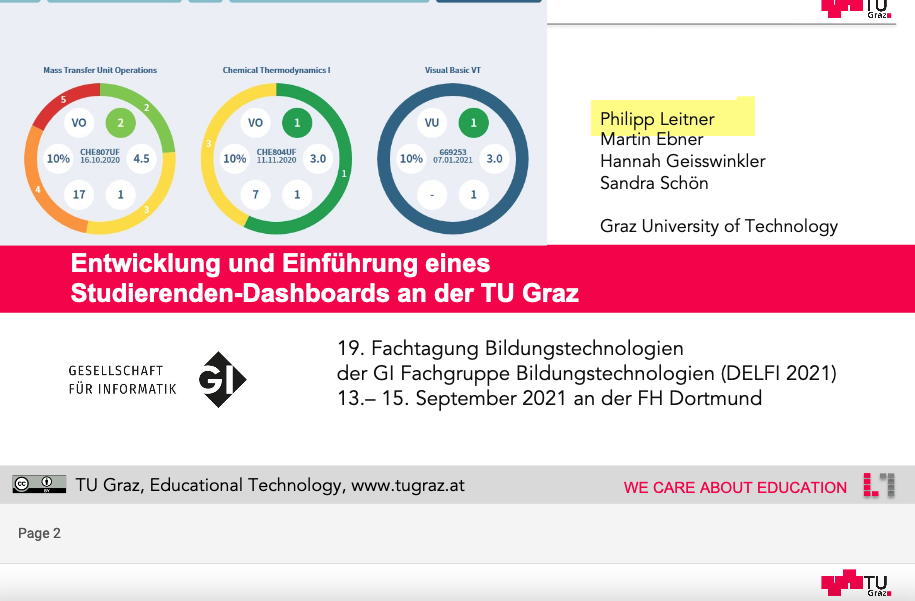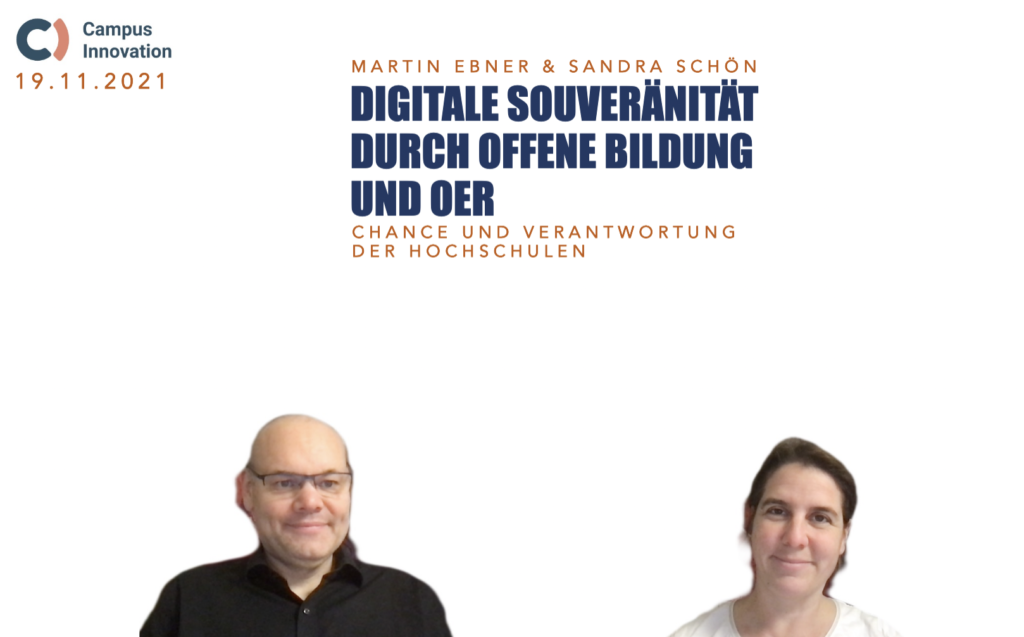Im Rahmen der DELFI 2021 haben wir über unsere Entwicklungen rund um eine Studierenden-Dashboard an der TU Graz berichtet. Hier findet man den Foliensatz:


Digitale Lehre an und rund um der Technischen Universität Graz
Im Rahmen der DELFI 2021 haben wir über unsere Entwicklungen rund um eine Studierenden-Dashboard an der TU Graz berichtet. Hier findet man den Foliensatz:

Wir wurden letztes Jahr gefragt ob wir für die Campus Innovation Konferenz 2021 eine Keynote halten wollen, rund um Digitale Souveränität und die Rolle von OER. Als besondere Herausforderung wünscht man sich, dass Sandra und ich dies gemeinsam machen sollen. Wir haben es probiert und hoffen auch, dass es gut angekommen ist – hier gibt es nachträglich noch die Vortragsfolien:

Referenz: Martin Ebner und Sandra Schön (2021). Digitale Souveränität durch offene Bildung und OER. Chance und Verantwortung der Hochschulen.Keynote auf der Campus Innovation 2021, 19.11.2021 [.pdf]
Our contribuation to this year ED-Media 2021 conference about „Effects of Remote Learning on Practitioner Integration“ got published. The slides are already here online.
Abstract:
The widespread inclusion of experts and practitioners in educational settings to teach and collaboratively learn can help alleviate a multitude of systemic problems. A new, inclusive path to teach youth the skills needed to utilise the problem solving approach named computational thinking is explored in this case study. During 2020 remote learning became ubiquitous and after a successful face to face workshop the consequences of a virtual environment were evaluated. This publication answers three questions based on an action research approach: What effect has remote learning on practitioner integration? What learning outcomes does a flipped classroom approach lead to? What lessons can be learned for a post-social-distancing world? Data was gathered during an expert driven virtual workshop, in an Austrian technical school with predominantly male students aged 17 to 18 (K-12). Analysis revealed the benefits of remote expert integration as relatively little overhead can establish practical knowledge and differentiated perspectives in an almost uninterrupted virtual workflow. The integration of practitioners should be made possible within virtual environments to minimise distraction and overhead if applicable. Despite its clear benefits a blended environment with additional face to face settings led to more interaction and excitement from the learners. Easy access to experts and practitioners is key to offer young people the tools necessary to face the challenges of the future.
[draft @ ResearchGate]
[final publication @ learntechlib]
Reference: Pollak, M., Sagbauer, N.N. & Ebner, M. (2021). Effects of Remote Learning on Practitioner Integration. In T. Bastiaens (Ed.), Proceedings of EdMedia + Innovate Learning (pp. 389-400). United States: Association for the Advancement of Computing in Education (AACE). Retrieved July 28, 2021 from https://www.learntechlib.org/primary/p/219684/
Martin wurde zu einer Keynote eingeladen rund um das Thema „Einführung zu OER und ihrer gesellschaftlichen Bedeutung„. Das ist natürlich ein spannendes Thema und wir hoffen es auch gut darzustellen, allerdings ist ja noch etwas Zeit hin. Jedenfalls freuen wir uns auf viele Teilnehmer:innen 🙂 :
Am Mittwoch, 8. September 2021 bieten das HIS-Institut für Hochschulentwicklung (HIS-HE) und das MMKH gemeinsam eine Online-Veranstaltung rund um das Thema der Qualitätssicherung von Open Educational Resources (OER) an. Die Teilnahme ist kostenfrei. Aus organisatorischen Gründen bitten wir um eine Anmeldung über den unten stehenden Button.
We are happy to present our research about „Evaluation Design for Learning with Mixed Reality in Mining Education based on a Literature Review“ at this year HCI International 2021 conference. Markus will introduce our work within the mirebook-project, which deals with mixed reality in education. Here you can find his slides:
We are happy to announce that the conference proceeding of the EMOOCS 2021 conference is now free and open licenced available.
[proceeding @ ResearchGate]
[proceeding @ conference host]
Reference: Meinel, C., Staubitz, T., Schweiger, S., Friedl, C., Kiers, J., Ebner, M., Lorenz, A., Ubachs, G., Mongenet, C., Ruipérez, J. A., Mendez, M. C., Merceron, A., von Schmieden, K. (2021). EMOOCS 2021. conference proceeding. Universitätsverlag Potsdam. pp. 308. ISBN 978-3-86956-512-5. https://doi.org/10.25932/publishup-51030
We were happy to present our research about „Making of an Open Makerspace in a Secondary Vocational School in Austria: Development, Activities, User Behaviour and Gender Balance “ at this year „EdMedia + Innovate Learning 2021“ conference.
Klicken Sie auf den unteren Button, um den Inhalt von www.slideshare.net zu laden.
We were happy to present our research about „Effects of Remote Learning on Practitioner Integration“ at this year „EdMedia + Innovate Learning 2021“ conference.
Klicken Sie auf den unteren Button, um den Inhalt von www.slideshare.net zu laden.
We were happy to present our research about „The relation of prior IT usage, IT skills and field of study: A multiple correspondence analysis of first-year students at a University of Technology“ at this year „EdMedia + Innovate Learning 2021“ conference.
Klicken Sie auf den unteren Button, um den Inhalt von www.slideshare.net zu laden.